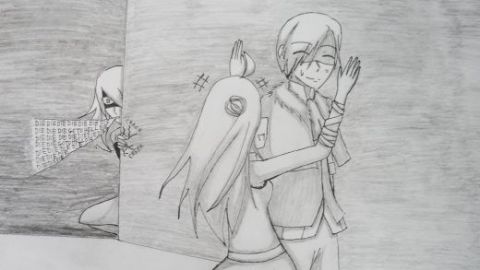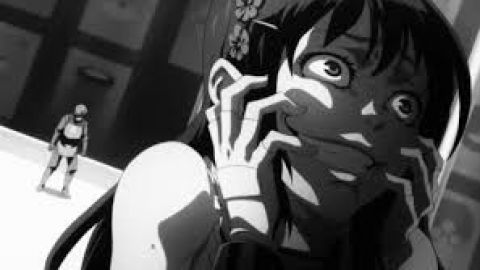The Second Shirt or Ticracan
When Ticraran first encountered him it was a day like any other. In Ticracan yesterday was no different than tomorrow. As always young girls thought about the boys they loved. As always young men, meandering between ad hoc congregations of ever changing composition, hurled haughty words at one another but thought of the women they would love. For them love had yet a delectable element of uncertainty, of hint, of whisper, of conquest. As always old women while trading in gossip like so much produce thought about the men they could have loved – if only, if only. As far as the old men of Ticraran were concerned – they, while shuffling aimlessly from place to place, or exchanging a seat in the sun for one in the shade, they, the old men, thought about the women who had loved them – once.
And, so you see, Ticracan was inextricably bound by a web of the most exquisite simplicity – by a web of thoughts of love – love past, present, future, active, passive, possible, putative; love ever and never and always. It was a web from which no one in the village was either capable or desirous of escape, a web which, far more than the whims of the geographic ever could, bound them together. Everyone in the village, young and old, was tied to everone else by those invisible silken strings of thoughts of love.
When did Loq’et arrive in Ticracan? Arrived is the wrong term. Perhaps we might better say “appeared” – because everyone held a differing opinion as to the past of Loq’et’s present, about the very first moment he appeared, or better put, about the last moment of Ticracan without him. Perhaps he had walked, perhaps hitchhiked, or perhaps he had simply been spat out by one of the buses which once a week made the thirty six hour journey from the capitol, sputtering blasphemy from their exhausts and rending asunder the would be, the once was, the soon to be again hauntingly a-temporal silence of the bucolic.
As it was impossible to know – or to agree upon – the precise moment of his being in Ticracan, so too was it impossible to know when Ticracan returned to its pre-Loq’et essence, to know just when no question needed to be asked – because to each one there was only one possible answer, to know just when the web of love-thoughts ceased to hold together those who belonged, those who comprised, those who were Ticracan.
Because Ticracan, of course, apart from the cows and pigs, apart from the stables and pens where those animals these animals were held when not nibbling at that whih the poet has called nature, and apart from the abodes of those whose task in life it was to serve these beasts, to fatten them, curse them, kill them, and yet because of them to live – apart from all of this and more than all of this – Ticracan was the handful or two or three of people woven by love past, future, iffy into a tapestry held together not by its entirity but by its bits, its stitches, its texture, its smell – none of them wholes, each a measure of dissolution.
When he appeared in Ticracan, Loqet felt that although physically present he no more belonged to it, no more was of it or could become of it than a flitting shade or breeze undiscerned. Perhaps this was sense – or perhaps it was simply the echo of an old one.
When he arrived in Ticracan he had to his name but a bundle of books and papers neatly bound with a leather strap, two shirts, and two eyes; meager possessions to be sure but of great significance in their own way.
His bundle of books and papers was without doubt the only one in the village. Yes, there were books, to be sure, but no bundle of them.There were papers but they were not free so to speak. They were relegated to certain prescribed tasks, preplanned purposes. One could predict, nay know with absolute certainty, their purpose and function. Indeed one could not imagine their being used for any other purpose than that for which they were preordained, predistened, condemned.
Loqet’s papers, on the contrary, were not subject to the all too predictable whims of beaurocratic predestination. They were free and could, if their owner so wished adapt themselves to to his purpose and bend themselves to his will; to depict or describe, to lament or despair, to essay to encompass that for which there is as yet no word in any human language. The papers of Ticracan knew only past and present – Loqet’s papers were to create future – or so thought Loqet.
His shirts too had a significance all of their own. One shirt of you a pauper makes – either condemned to wear one always defiled or from time to time to do without. Three shirts of you a slave make – you must decide which to don according to circumstance, to mood, to climate, and the shirts of those around you. Yes, three shirts a slave of you make, one a pauper, but two – two leave you free to decide which you wish to be.
Ticracan had a stranger in its midst to be sure. His name was Loqet – or have we already mentioned that? He left the capitol where he was small and his life unpercieved and came to Ticracan where, he hoped, simply by being not of Ticracan and Ticracan being small enough he might become, if not the center of life, at least one of life’s centers. In the capitol nobody paid him any attention. His comings and goings were of interest to no one. His solitude was such that it bordered on invisibility. He became the perfect invisible man. People passed him on the street without seeing him, and when he did see a smile of recognition on the face of a passer by there was doubtless someone behind him at whom the gesture was in fact directed. Nobody ever wondered about him. On the gossip market there was simply no value for a Loq’et gossip for there was no Loq’et gossip. He could have lived another century or have died a century before. Not only did it make no difference to the fabric of the capitol but, what is worse, the capitol was and would be oblivious to either.
His life in the capitol, therefore, oscillated between one of but illusions and dreams – unacceptable as a steady diet – and one utterly devoid of illusions and dreams, which is unbearable. Many a time as he sat gazing through the window of the café at the plaza and cathedral, waiting for his cup of coffee, a feeling would come over him that he had not ordered a thing, that the waiter had not seen him and therefore would not, could not serve him. The houses of the capitol with doors wide open were closed to him. In short the tragedy of Loqet’s life – as it appeared to Loqet himself – was that his tragedies were comical. Life is indeed a comedy for those who think and a tragedy for those who feel (though I have been told that the reverse is true). The capitol became for Loqet an archipelago of islands, on each his shadowy visage forever on trembling knee running yet advancing not at all, stiving vainly to navigate the seemingly insurmountable flood waters of his mind which separated the bodies of land from one another.
“Everyone” thought Loqet “Everyone enters every home. A man returns home and tells his wife that he bumped into Mr. So-and-so whose son was doing such-and-such. She in turn tells gives him the lastest news about Mrs. So-and-so whose daughter was engaged to be married to the young Mr. Blah-blah. And so everyone, by law of averages, enters every home. I haven’t been in one ever.”
And it was for this reason ( because silence speaks with the loudest voice) that he came to Ticracan where he felt certain that he would be invited, nay, brought forcibly into every home. Gossip would fly like so many chattering geese, would bloom like spring flowers. Questions would be asked, answered, solutions proferred, discarded, houses of cards built around him. And he willy nilly would become the talk of the village. Should he write a letter, the whole village would know to whom it was addressed. The pages of his manuscript, to which he was to entrust descriptions of everyone and everything, would be read – surreptiously to be sure – but read nonetheless. His portraits of Ticracan, of its inhabitants, its houses, its flowers, saints and demons, would be read discussed, accepted and reality itself bent to conform to his portraits. Inanimate objects neither change nor react when one describes them as beautiful or worthless, ugly or inspiring. They just are. Men, however, do react and it is their reaction which betrays your entry into their lives. It is their reactions which admit the traces of your passage through life on the dust of theirs.
So many observations to be made, so many portraits painted, such a web of love – past, present, future, possible, putative






this is chapter I. There is a lot more to come. Oh Horror!